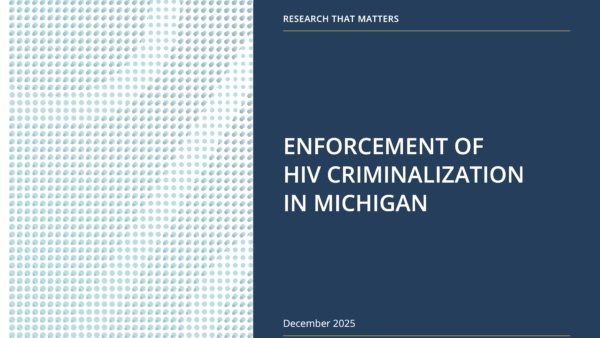
Published in 20 minutos on March 12, 2019 (Google translation, for article in Spanish, please scroll down)
Local deputy calls for repeal of criminalization of HIV patients
Local Congressman Temístocles Villanueva Ramos considered that the authorities of Mexico City are obliged to provide adequate information, education and support, to guarantee access to means of prevention and treatment, as well as to eradicate the criminalization of those suffering from HIV and other sexually transmitted infections.
Presenting an initiative that reforms Article 76 and repeals Article 159 of the Criminal Code of the Federal District, the legislator for Morena indicated that criminalizing diseases such as the Human Immunodeficiency Virus (HIV) hinders the duty of the authorities to guarantee public health while respecting human rights.
“The criminalization of HIV generates more harm than benefits in public health and human rights, so this initiative aims to repeal the article and reform the other to eliminate sentencing and the type of transmission risks” said the legislator.
He explained that currently Article 159 of the Criminal Code treats sexually transmitted infections differently from any other diseases since it specifically penalizes the health condition of the active subject, which causes a discriminatory distinction between people who live with a disease acquired by sexual infection and those who have some other disease acquired by other means,
“The penalty for exposure to infection is based on the risk of harm, not on the harm itself, which overstates the responsibilities of people with HIV, limiting their adequate access to justice,” he lamented.
Villanueva Ramos said that in Mexico, as well as in other countries around the world, people with HIV are subject to criminal law when they expose other people to the virus. However, according to UNAIDS, there is no evidence that these measures generate justice or prevent the transmission of the virus.
“If penalties for people with HIV and sexually transmitted infections (STIs) are eradicated, discrimination is reduced and cultural barriers to timely detection and prevention are eliminated,” he said.
Villanueva Ramos warned that the main problem with the classification of “exposure to infection”, both in the Federal Criminal Code and in local codes, is the ambiguity of the definition of incriminating behaviours, so that the jurisdictional authority is the one who decides in most cases which diseases are considered serious or which behaviours are punishable.
This type of measures that end up violating the human rights of people with HIV without contributing to the eradication of the epidemic can also be observed in other countries,” he said.
Pide diputado local pide derogar criminalización de enfermos de VIH
El diputado local Temístocles Villanueva Ramos consideró que las autoridades de la Ciudad de México están obligadas a suministrar información, educación y apoyo adecuados, así como garantizar el acceso a los medios de prevención y tratamientos, así como erradicar la criminalización de quienes padecen VIH y otras infecciones de transmisión sexual.
Al presentar una iniciativa que reforma el Artículo 76 y se deroga el Artículo 159 del Código Penal del Distrito Federal, el legislador por Morena indicó que criminalizar las enfermedades como el Virus de la Inmunodeficiencia Humana (VIH) obstaculiza el deber de las autoridades para garantizar la salud pública respetando los derechos humanos.
“La criminalización del VIH genera más daños que beneficios en la salud pública y los derechos humanos, por lo que la presente iniciativa tiene como objeto derogar el artículo y reformar el que le hace referencia para eliminar la pena y el tipo de Peligro de Contagio”, dijo el legislador capitalino.
Explicó que actualmente el Artículo 159 del Código Penal da un trato distinto a las infecciones de transmisión sexual respecto a cualquier otra enfermedad, ya que se penaliza específicamente la condición de salud del sujeto activo, lo que provoca una distinción discriminatoria entre las personas que viven con una enfermedad adquirida por contagio sexual y quienes tienen alguna otra enfermedad adquirida por otros medios.
“La pena por Peligro de Contagio se basa en el riesgo de daño, no en el daño mismo, lo cual sobredimensiona las responsabilidades de las personas con VIH, limitando su acceso adecuado a la justicia”, lamentó.
Villanueva Ramos manifestó que en México, así como en otros países del mundo, a las personas con VIH se les aplica el derecho penal cuando exponen a otras personas, no obstante, de acuerdo con Onusida, no hay datos que comprueben que estas medidas generen justicia o que se prevenga la transmisión del virus.
“Si se erradican las penalizaciones a las personas con VIH e infecciones de transmisión sexual (ITS) se disminuye la discriminación y se eliminan las barreras culturales para la detección oportuna y la prevención”, aseguró.
Villanueva Ramos alertó que el principal problema de la tipificación de “Peligro de Contagio”, tanto en el Código Penal Federal como en los códigos locales es la ambigüedad de la definición de las conductas incriminatorias, por lo que la autoridad jurisdiccional es quien decide en la mayoría de las ocasiones qué enfermedades se consideran graves o qué conductas son las punibles.
“Este tipo de medidas que terminan violentando los derechos humanos de las personas con VIH sin aportar a la erradicación de la epidemia también se pueden observar en otros países”, refirió.









